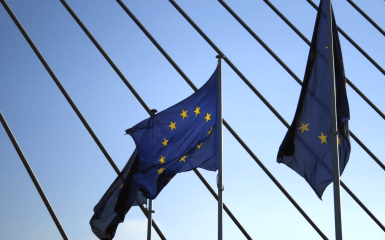The Council of the European Union adopted the 14th package of sanctions against Russia. They concern the spheres of energy, finance and trade, and will also make it more difficult for Russia to circumvent sanctions.
Points of attention
- Among the measures in the package are restrictions on individuals and legal entities that threaten the territorial integrity of Ukraine.
- The package also includes prohibitions and restrictions on transshipment of Russian LNG to the EU and investments in LNG projects.
- The EU plans to make it more difficult to circumvent Russian sanctions by restricting the re-export of military equipment and financial transactions.
- The package also provides for sanctions against specific vessels that contribute to Russian aggression in Ukraine, and the expansion of import and export controls.
What was included in the 14th package of EU sanctions against Russia?
These measures target high-value sectors of the Russian economy, such as energy, finance, and trade, and make it even more difficult to circumvent EU sanctions.
Today's package includes restrictive measures against another 116 individuals and legal entities responsible for actions that undermine or threaten Ukraine's territorial integrity, sovereignty and independence.
LNG
In particular, the Council of the EU introduces a ban on the transhipment of Russian LNG in the EU for further shipment to third countries. The restriction applies to both ship-to-ship and ship-to-shore transfers. At the same time, the ban does not apply to the import of LNG into the EU itself.
In addition, new investments in LNG projects in Russia, such as Arctic LNG 2 and Murmansk LNG, are prohibited. Provision of goods, technologies and services for these projects is limited.
EU Council also approved introducing restrictions on importing Russian LNG through EU terminals not connected to the gas system.
Combating sanctions evasion
To make it more difficult to circumvent sanctions and prevent Russia from waging war in Ukraine, the EU will oblige companies to bear responsibility for the actions of subsidiaries in third countries if they help to circumvent sanctions. The re-exportation of military equipment produced in the EU to Russia will also be limited.
Agreements on the transfer of technologies will have to contain a clause prohibiting their use for the production of goods for Russia.
Finances
EU companies outside Russia are prohibited from connecting to the Russian alternative to SWIFT, the Financial Messaging System (SFMS). Transactions with targeted credit and financial institutions and crypto-asset providers established outside the EU are also prohibited.
Financing of political parties and other organisations
In response to Russia's interference in EU democratic processes, the Council decided to prohibit political parties, NGOs, think tanks and media in the EU from receiving funding from the Russian state and its controlled structures. This measure does not limit the work of journalists, for example, conducting research and interviews.
Transport
For the first time, the EU introduced sanctions against specific vessels that contribute to Russian aggression in Ukraine. These vessels are prohibited from entering EU ports and receiving services.
Vessels are subject to sanctions for some reasons, such as:
Transportation of military equipment for Russia
Transportation of stolen Ukrainian grain
Support for the development of the Russian energy sector ( LNG transportation and transhipment)
The sanctions also target Putin's "shadow fleet," which circumvents EU and Coalition price cap restrictions by using deceptive shipping methods and ignoring international standards.
Twenty-seven such vessels were sanctioned.
Import-export controls and restrictions
Sixty-one organisations that help the Russian military industry, including those from third countries, have been added to the sanctions list. For them, restrictions on the export of dual-purpose goods and goods that strengthen the Russian defence sector have been strengthened.
The list of prohibited goods has been expanded, including machine tools, all-terrain vehicles, chemicals, manganese ores, rare earth metals, plastics, earthmoving machines, monitors, electrical equipment.
The regime's import of helium from Russia, which is an important source of income, is limited.
In addition, Liechtenstein has been added to the list of partner countries that apply a set of restrictive measures on the import of iron and steel from Russia, as well as a set of import control measures that are essentially equivalent to EU measures.
Protection of EU operators
The Council allows EU operators to seek compensation for damage caused by Russian companies through sanctions and expropriation. It also creates a tool for compiling a list of companies that are prohibited from transactions for interfering with arbitration and judicial competence.
Other measures
In response to Russia's actions limiting the rights of intellectual property owners from the EU, the Council of the EU supported the ban on submitting applications for registration of certain intellectual property rights (patent, trademark, design) in the EU, as well as restrictions on the use of already registered rights.
In addition, the EU Council also supported the ban on the purchase, import, transfer or export of cultural values from Ukraine, if there is reason to believe that they were illegally exported.
EU sanctions against Russia
Since the beginning of Russia's full-scale aggression in Ukraine, the European Union has been steadily increasing the pressure of sanctions. 13 packages of sanctions have already dealt a tangible blow to the Russian economy and military potential.
The official agreement of EU ambassadors' 14th package of sanctions took place on June 20.




